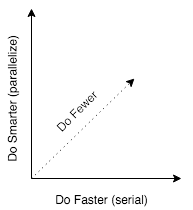Mutation Selection Approaches
According to Offutt et al. (Offutt 2001), mutation selection approaches can be categorized into three orthogonal techniques: Do fewer, Do faster, and Do smarter.

Do Smarter
Improve the mutation analysis run-time by splitting tasks across multiple processes or machines, and running in parallel. The main innovations under this category involves scheduling how mutations are to be run.
Do Faster
Improve the mutation analysis run-time of a single mutant, or that of the whole set without using parallelization. It includes compiler integration of mutation analysis, byte-code modification rather than source modification, techniques using mutant schemata etc.
Do fewer
Reduce the number of mutations that are examined. It involves operator selection, clustering, sampling, pre-execution reduction using static analysis etc.
Ideally, one should be able to apply methods under each category independently since they are orthogonal. That is, parallelization of mutants should not affect the improvements possible using either a better algorithm for analysis of a single mutant, or advances in sampling mutants.